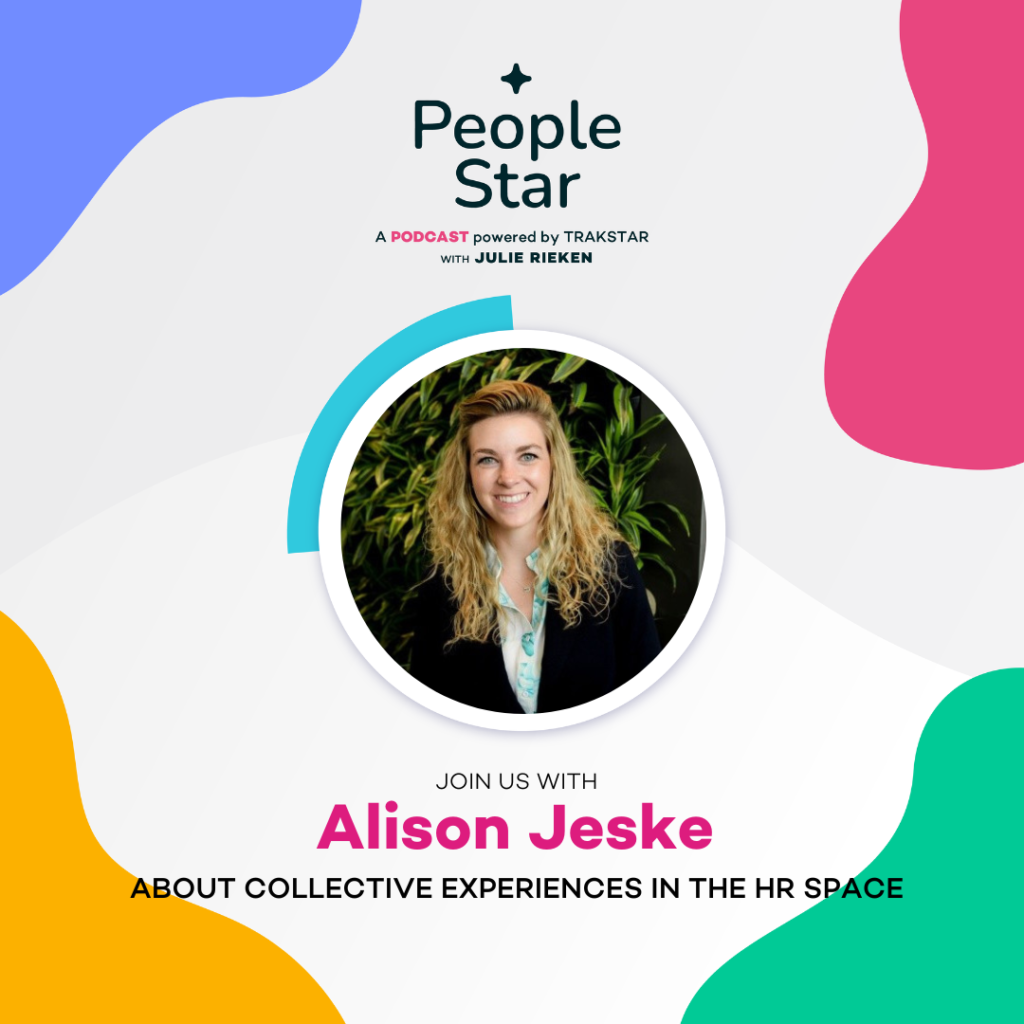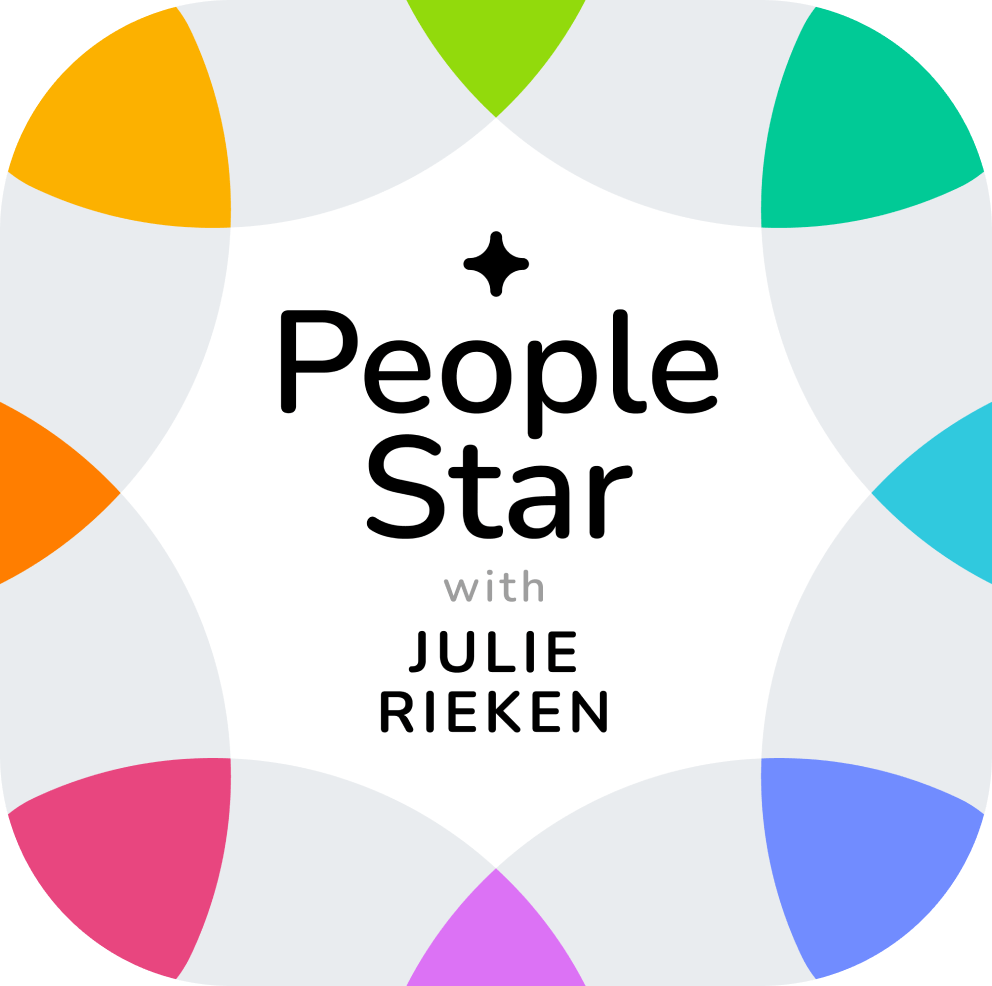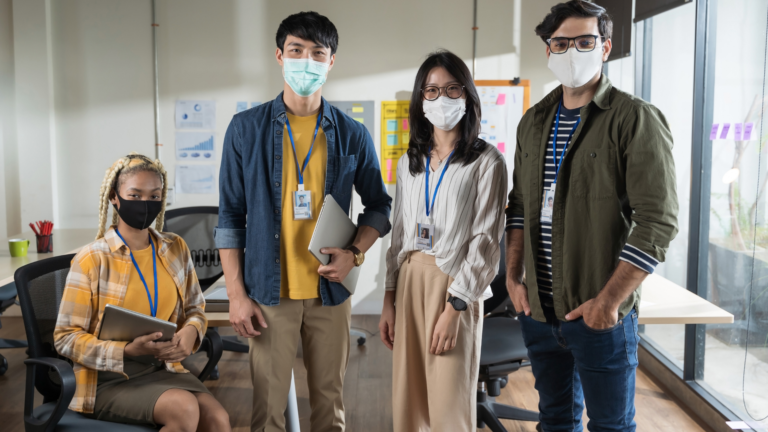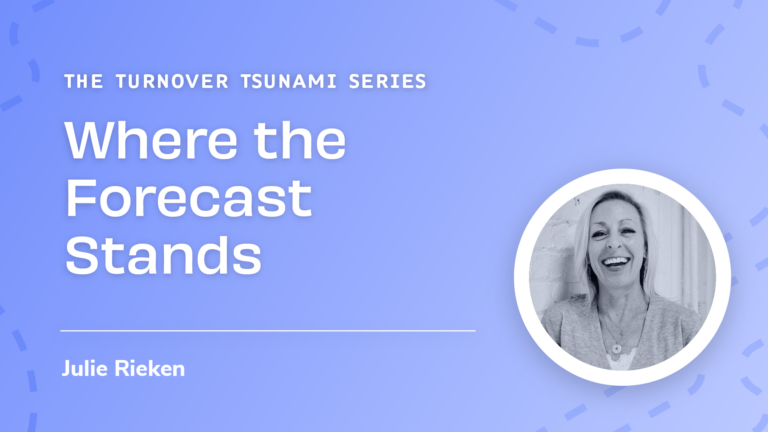PeopleStar_Alison Jeske: this mp3 audio file was automatically transcribed by Sonix with the best speech-to-text algorithms. This transcript may contain errors.
PaopleStar Intro:
Welcome to the PeopleStar Podcast. We deliver leadership perspectives from industry experts on their people, architecture, routines, and culture as they solve HRs newest challenges. And now your host, Julie Rieken.
Julie Rieken:
Hello PeopleStar listeners, Julie Rieken here, host. I am so excited today! I've got Alison Jeske with me. Alison and I work together. We actually serve on the Mile High Sherm Board of Directors. Alison is our distinguished president, guiding HR professionals in the Denver metro area, and also serves as the Director of Human Resources at Food Service Holdings, and Alison just has so much information to share. Alison, this is going to be a really fun conversation for us.
Alison Jeske:
Thank you for having me, Julie.
Julie Rieken:
So I'm thinking about the state of HR today and some of the things that we are thinking about in terms of the HR professional people in the Denver metro area, which I'm certain echoes some of the experiences in other major cities around the United States. And I've been thinking a lot about that. And Alison, I wanted to just start with you have to be thinking a ton about this in your role as the President of a super mega chapter, and how do you help professionals in the Mile High area who are HR professionals? So talk to me about that. Tell me a little bit about how you're thinking about serving HR professionals in big cities.
Alison Jeske:
A lot has changed. We used to be fully in-person planning all of these events for our staff to commute to, and then the last two years we really changed our model to meet our membership where they're at. People want connection, people want the opportunity to build these relationships, whether that's virtual and in-person, and we're really finding a nice split between those two different formats. And we've been seeing that this need for face-to-face, there's a whole group of our membership that just want that, they get in the room together, we had a happy hour where we couldn't even get anyone to stop talking. They were just so energized to be together again. And then we've got webinars, great educational content, our folks are joining but our virtual roundtable, which is essentially virtual networking, that has had attendance through the roof. So we're seeing that no matter the format, there's just this energy to find like-minded HR professionals that you can talk to.
Julie Rieken:
Tell me more about that, Alison. So you mentioned you had this light bulb moment. You were at, we have a group called MCAP and you can tell us what that is. And what was this moment that you had with this group recently? Can you talk about that?
Alison Jeske:
Yeah, there is, so there's two moments. The first one was at the happy hour, when I just saw the energy of everyone being so excited to see each other. And then the second one was this more, it's a smaller cohort. They are selected to be in the MCAP, which stands for My Career Acceleration program, and these are more seasoned HR professionals that are going through this six-month program to get them ready for their next HR role, whether that's an HR manager role or an HR director role, they're really looking to address their career. And what's so cool about this group is that they're going to spend the next six months together learning about how to become better HR leaders, and they're also going to be able to create this relationship with one another. And so when I went to the kickoff event for this, I was going around the table. And again, it was just all of this energy of just of this group saying, I'm so excited to have a small group of HR professionals that I'm going to get to know that I'm going to be able to network with and learn from their experiences, because a lot of what they do, what they meet is talk about what each of them are experiencing in their role, and that information sharing as an HR professional is so critical to how successful we are in our position, because, lots of times, you can't go read in a textbook what people are going to do. You have to have a HR colleague or a mentor that's experienced something similar to you or more than you that you can turn to and say, hey, I've never done this before, have you seen this? And that's what I have found to be really successful in my career is, is finding those folks that I can go to and have those conversations because I haven't experienced everything, nor will I ever. But I know someone in the mile-high HR community has experienced what I'm going through and has some advice for me.
Julie Rieken:
I think those connections are really important. I was on the phone with a customer today and this customer was, of course, an HR professional because that's what we do, and this customer said one of the things they've been talking about is when do they get to go back to their jobs? Meaning when do they get to go back to being the HR professional that they were before the pandemic? And she said, we're never going back and the landscape has changed and we started talking and I said, oh my gosh, I feel like I'm living inside your words. Like it was the deepest level of empathy. And I told her after it was done, I'm like, oh, my heart feels better, I feel like I've just lived a moment with somebody, it was like I had to have that connection. And I think HR people are experiencing this, so when you describe this moment in this MCAP meeting of not, of people not wanting to be quiet because they had so much to share, what do you think the things are that we've collectively experienced? What have we experienced together as HR professionals in the last couple of years?
Alison Jeske:
Yeah. I mean, the first question we all ask each other is, are you working from home? And are you still working from home? So we're, you know, navigating, learning, and hearing from people that still are not in the office and never will be back in their office. Their complete workspace has been pulled out from under them, and they're not going to have a in-person spot ever again. So the folks like myself who never left and it was 50-50 around the table of folks that had hybrid, folks that never left, and people that were fully hybrid, and so that's always the first question I hear. The other one is, did you have to do layoffs? And so then we talk about that and how we made it through that piece of it. And it's just, we all had these different experiences and it's so therapeutic to talk to someone that maybe had a similar one just to like process it all because it happened so quick. And that was the other, the comment that everyone said was, man, that was two years ago, it literally, there are days where it feels like it was yesterday.
Julie Rieken:
Yeah, I think, I think that's really true. I feel like while everybody had to make shifts during the pandemic, I feel like this was, I mean, I know it feels like, but my area was harder, but I think it actually was for HR. I really believe that it was because HR has absorbed emotional trauma alongside, you know, workplace disruptions and change, like you were saying, the move to home office, that was a heavy lift for HR. One of the customers I talked with actually this week said they felt like triage nurses and I was like, wow, that's a new role for an HR person.
Alison Jeske:
Yeah. I mean, we were crisis management 24/7 and having to communicate out changes constantly to our staff, keep them abreast of what's going on. You know, they would, they would go home and see something on the news and they didn't know if they could even come back into the office that next day. And so you're just constantly current managing all of these messages and making sure that you message it out to your staff appropriately so they know what they should and should not be doing. And I don't know if I could have gotten through any of this had I not had my community around me because I had people that I could go vent to and talk to, and it's, you have to get some of this stuff off your chest to really heal and move on from it.
Julie Rieken:
I think so, too. So that leads me to maybe a piece of, maybe a piece of advice for, for HR professionals that are out there in terms of networking, do you have a piece of solid advice for people that are, that are maybe alone in this world in their large cities?
Alison Jeske:
Yeah. You know, I firmly believe that, and I was an HR department of one for a while, but I never felt like an HR department of one because I was very intentional in engaging with Mile High Sherm in building a community around me. If I didn't have that community, I would not be as successful as I am today. And it's more of just the information bouncing or brainstorming that you can do impromptu with someone. And so HR can be a very, very lonely role because there's so much confident, there's so much confidential information that happens within sight, within our walls. And we can't talk to really anyone about it, but we can talk about it with each other. So if you are an HR team of one or even a small team, you feeling alone is something that you can control and change. And you can do that by engaging with your Mile-High membership and really build a community of people that you could go to.
Julie Rieken:
I agree. I think no matter what chapter is for us, for you and I, here in Denver, it's Mile High Sherm, and I find a ton of friendships and connection and the ability to just talk about what's going on in the world with that group, I think it's super valuable. I want to thank you for guiding our group back in person. We had, by the way, our in person conference in January and this was during the height of the Omicron peak, remember, Alison?
Alison Jeske:
Yeah!
Julie Rieken:
That was, but gosh, we had a good turnout, right?
Alison Jeske:
It was fantastic. We, we had a mask mandate, a vaccine mandate and everyone still came. And the buzz of people leaving, they're like, please, please keep having in-person events. We want to be there, we need this, it was fantastic to be together and you can do a lot of stuff in a safe way so that people feel comfortable being back in person. And I think that's what Mile High Sherm has done a really great job.
Julie Rieken:
I think so, too. And I want to thank you for helping HR professionals in the metro area find those connections for people like me, for people like you, and for all of our membership, whether you're in Atlanta, you're in Detroit, you're in, you know, San Jose or Denver, it doesn't matter, finding your local connection, I think, and networking is really important for our own survival as triage nurses or whatever we are now.
Alison Jeske:
Yes! And everyone, they, they hate that buzzword. They're like, oh gosh, I have to go network to find friends, and it's like, it's not scary. As soon as you walk into the event, someone's going to start talking to you and you'll make a connection. So you just have to, wherever you are, like you said, Julie, just go to that first event, just dive into that first event, and you will make minimum one friend there, I guarantee it. If you've ever been to National Sherm, if you've gone out after any of the educational stuff at National Sherm, you can find a million friends because everyone is excited and ready to meet people. So it's the same for all your local events as well.
Julie Rieken:
That's so true. Alison, are you going to National Sherm this year?
Alison Jeske:
Unfortunately, I am not, but I have gone a lot of other years, so.
Julie Rieken:
But I'll be there rooting for everybody that is there.
Alison Jeske:
Yes, exactly.
Julie Rieken:
Cool. Alison, this has been super great to talk to you about your vision, the things that you gain from being our local chapter president, for being able to guide us as HR professionals here, and I'm grateful for your time today. Thank you for being a guest.
Alison Jeske:
Awesome. Thank you, Julie.
PaopleStar Intro:
Thanks for listening to the PeopleStar Podcast. For the show notes, transcript, resources, and more ways to get a seat at the table, visit us at TrakStar.com/Podcast.
Sonix has many features that you’d love including automated transcription, automated translation, advanced search, share transcripts, and easily transcribe your Zoom meetings. Try Sonix for free today.




